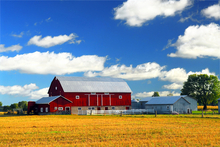Doing some simple projects before the snow flies can make horse chores a lot easier during the winter.

Winterizing your horse barn
Horse owners should take five important steps to prepare horse barns for winter weather and make sure they are healthy, safe and comfortable for their horses..
“Don’t wait until the first snowfall to get ready for winter. By then it’s too late,” says Laurie Cerny, editor of Horse Cent$ Magazine and good-horsekeeping.com. “You’ll feel more ready for winter if you do some of these things now.”
- Check all barn doors and windows to make sure they close properly. Replace anything that’s broken from windows to door latches. Just as important is to make sure that the door tracks are cleaned out. You’ll want ample clearance to allow for snow, ice, and even for the expansion of frozen ground.
- Clean out the cobwebs. Cobwebs can be a fire hazard when they cover lights and electrical outlets. When covering windows they also reduce the amount of natural light that comes into a barn during the winter.
- Update your lighting. This means replacing burned out bulbs and possibly adding lighting to areas that get even darker during the winter like entryways, and wash racks and grooming areas. For general lighting you may want to change traditional light bulbs out for ones that use less energy. Solar sensor nightlights work great for bathrooms and other areas that could use some continual lighting throughout the day and night.
- Stock up on staples. This means bedding, hay, grain, and anything else that you use on a regular basis. A good rule of thumb is to have at least a 30-day supply on hand at all times. There’s nothing worse than being down to your last can of grain, or bag of sawdust in the middle of a snowstorm.
-
Check all of your water tank and pail heaters. Make sure they are working properly and that the electrical cords and plugs are in good shape. Store any unused water tanks indoors, or inside of a horse trailer. If storage is not possible, at least turn them upside down.
